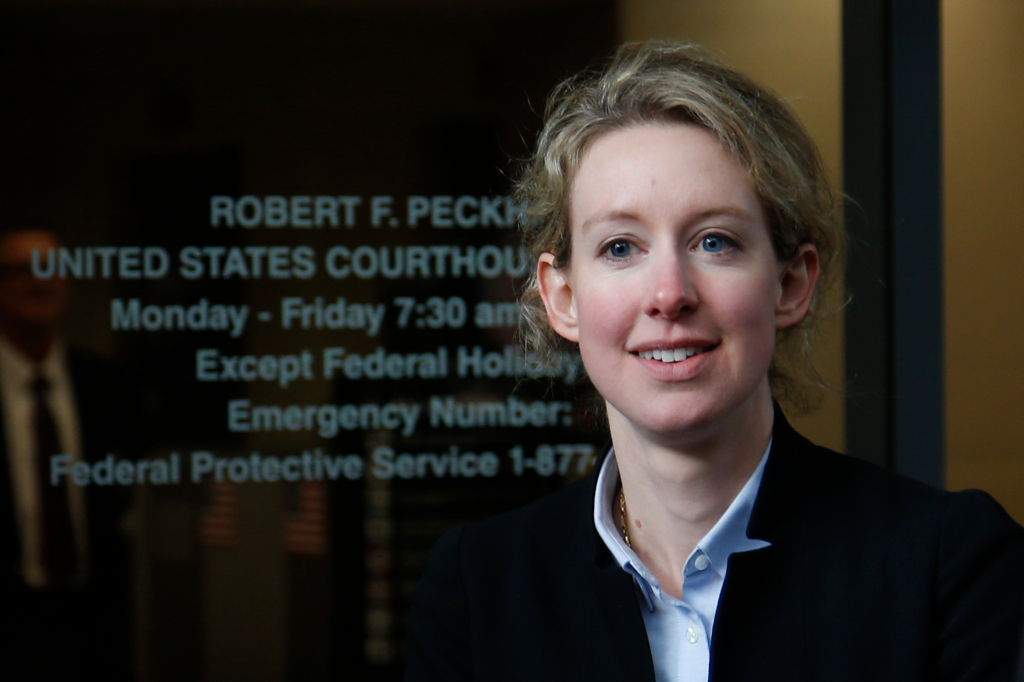Former Theranos CEO Elizabeth Holmes is trying to prevent the jury in her upcoming criminal trial from hearing claims by federal prosecutors that her “luxurious lifestyle” provided a motive for fraud.
In one of 20 motions Holmes’ legal team filed Friday seeking to exclude evidence, lawyers for the founder of the defunct Palo Alto blood-testing startup said the government wants to allege that she received benefits including company-funded luxury travel, and a substantial salary that allowed her to drive a fancy SUV, rent an expensive home and buy pricey goods. The feds also want to tell the jury that she had Theranos-paid assistants run personal errands and buy expensive merchandise, the filing said.
“The government has further stated that it intends to offer evidence that Ms. Holmes associated with ‘celebrities, dignitaries, and other wealthy and powerful individuals,’” according to the filing in U.S. District Court in San Jose.
Prosecutors’ proposed list of exhibits to be used as evidence reveals their plan to present Holmes as “a billionaire who took private flights and appeared on magazine covers,” the filing said. Together, the claims about her lifestyle signal an intention to elicit an emotional response from jurors and appeal to “class prejudice,” the filing argued.
Holmes, a Stanford University dropout, and former Theranos president Sunny Balwani, are charged with a dozen felony fraud counts. They’re accused of bilking investors out of hundreds of millions of dollars, and defrauding doctors and patients, with false claims that the company’s machines could conduct a full range of tests on just a few drops of blood. The two have denied the allegations, with lawyers for Holmes arguing in a court filing that the government’s case was “unconstitutionally vague” and lacked specific claims of misrepresentation.
The U.S. Supreme Court has warned that allowing appeals to class prejudice can poison jurors’ minds and cause an unfair trial, the filing said.
In fact, the financial benefits that Holmes gained from Theranos — valued at $9 billion in 2014 — were “modest” when compared to those received by many CEOs of multi-billion companies, according to the filing. “She took a lower salary even than the salaries of other Theranos executives,” the filing argued.
“And, although she owned a substantial amount of Theranos equity, she never sold any equity in the company — despite opportunities to do so and contrary to what one would expect if she intended to benefit from a massive fraud.”
Holmes “achieved financial success by dint of her hard work and innovation,” and “many CEOs live in luxurious housing, buy expensive vehicles and clothing, travel luxuriously, and associate with famous people — as the government claims Ms. Holmes did,” according to the filing.
The feds’ bid to use evidence of her lifestyle as a motive for crime rests on a false assumption that any wealthy person would be prone to fraud, the filing said. “The amount of money Ms. Holmes earned in her position at Theranos, how she chose to spend that money, and the identities of people with whom she associated simply have no relevance to Ms. Holmes’ guilt or innocence,” according to the filing, which cited a court finding in another case that it was irrelevant whether the accused man had “spent his fortune on lavish parties, instead of donating it to starving Malawian orphans.”
The other 19 motions filed Friday include attempts to exclude evidence related to Food and Drug Administration inspections, news stories and “alleged blaming and vilifying of competing companies and journalists.”
Holmes’ trial is scheduled to start in March. She faces maximum penalties of 20 years in prison and a $2.75 million fine, plus possible restitution, the Department of Justice has said.










